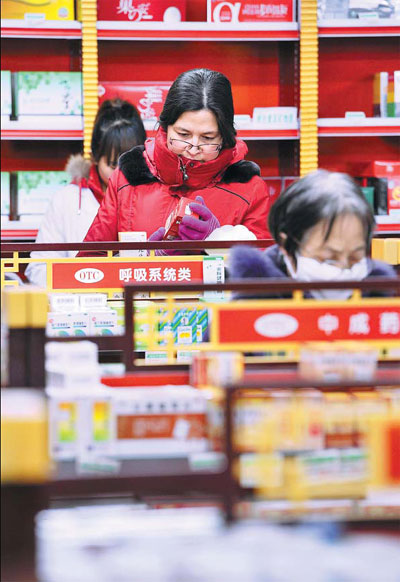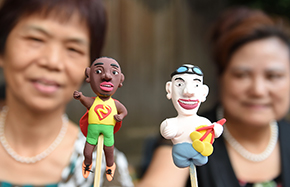Price cut for 20 types of drugs
By LAN LAN (China Daily) Updated: 2013-01-09 09:42China will adopt new methods, including international price comparisons, to regulate the price of imported drugs, an official at the country's top price regulator said on Tuesday.
After five price adjustments since 2011, large-scale price drops in Western medicines have almost been completed as part of ongoing efforts to lower customers' medical costs.
|
Customers shop for over-the-counter medicines at a drugstore in Yinchuan, Ningxia Hui autonomous region, on Tuesday. The country's price regulator announced a 15 percent price cut on more than 20 types of drugs starting on Feb 1. [Photo/Peng Zhaozhi/Xinhua] |
Chinese herbal medicine will be the next priority for price adjustments in 2013, and high-priced drugs with high profit margins will see further cuts, said Song Dacai, director of the medicine pricing section of the National Development and Reform Commission, the country's top economic planning body.
Drug prices should be adjusted in accordance with changes in manufacturing costs. Imported drugs will probably be priced using international price comparisons, said Song.
Data on prices are still being collected and analyses made, with reference to markets such as the United States and Japan, Song told China Daily.
"Each country or region has its individual pricing system, tariff and logistic costs. We will form our own pricing method with reference to theirs," he said, adding the method is aimed at limiting a monopoly on drug prices.
The agency on Tuesday announced it will cut the maximum retail prices of about 400 drugs in 20 categories, including medicines used to treat respiratory diseases and fever, by an average of 15 percent, starting on Feb 1.
This is the fifth round of drug price adjustments since 2011 for products included on the essential drugs list. The average reduction for involved high-priced drugs will be up to 20 percent.
Prices for medications used to treat cancer, blood diseases and illnesses related to the nervous system have been cut since 2011, according to the commission.
China has begun a national medical reform aimed at providing more affordable medical care. The central government has pledged to pour 850 billion yuan ($135 billion) into reforming the country's medical system and building a basic medical insurance system.
In 2009, MSD, know as Merck in the US and Canada, voluntarily slashed the price of a drug used for treating coronary heart disease, making it the first innovative medicine produced by a foreign company to be included on the essential drugs list.
"The decision was not made from a sales perspective, but a wish to be proactive in supporting China's health reform. We will continue to support efforts to help patients receive better treatment," said Pam P. Cheng, president of MSD China.
Liu Jie contributed to this story.
- Nepal's private sector forms body to promote Belt and Road Initiative
- China's natural gas transmission tariffs proposals positive for industry
- 240 SMEs debut on New Third Board
- Smartphones help blind people see the world
- Kickboxing and throwing punches: Welcome to flight security training
- China's tech sector far mightier than Australia's: Columnist
- Detroit carmakers now have sights on Silicon Valley
- Rental companies expand fleets ahead of likely changes


















